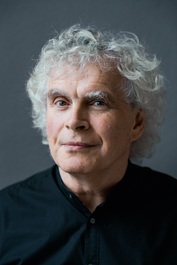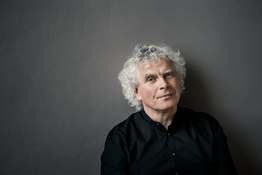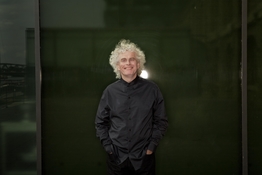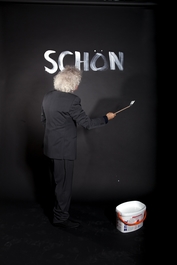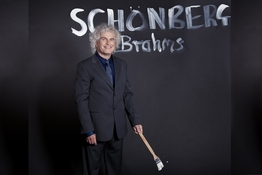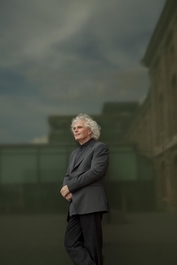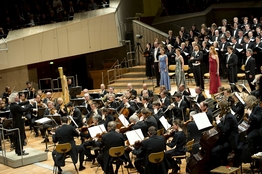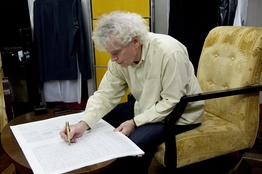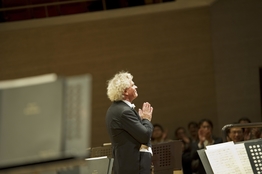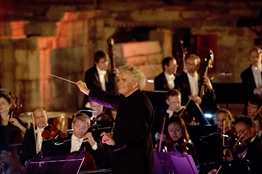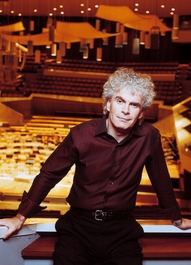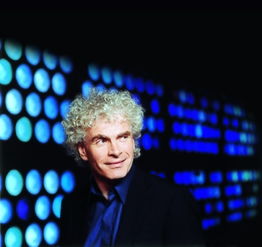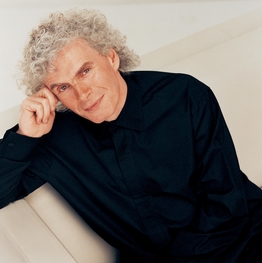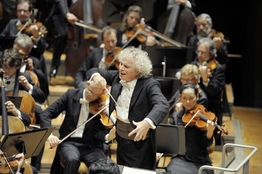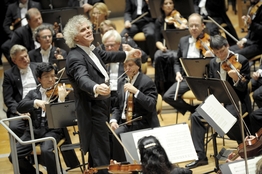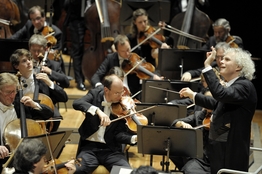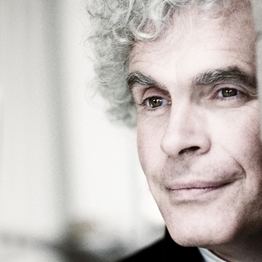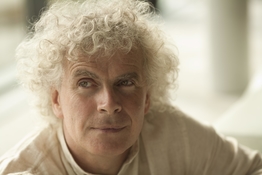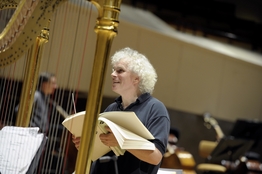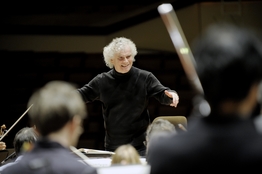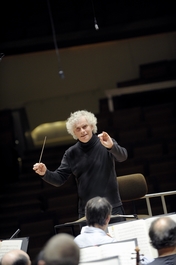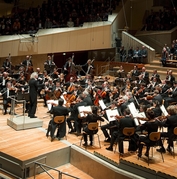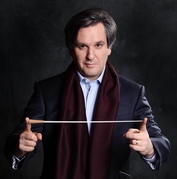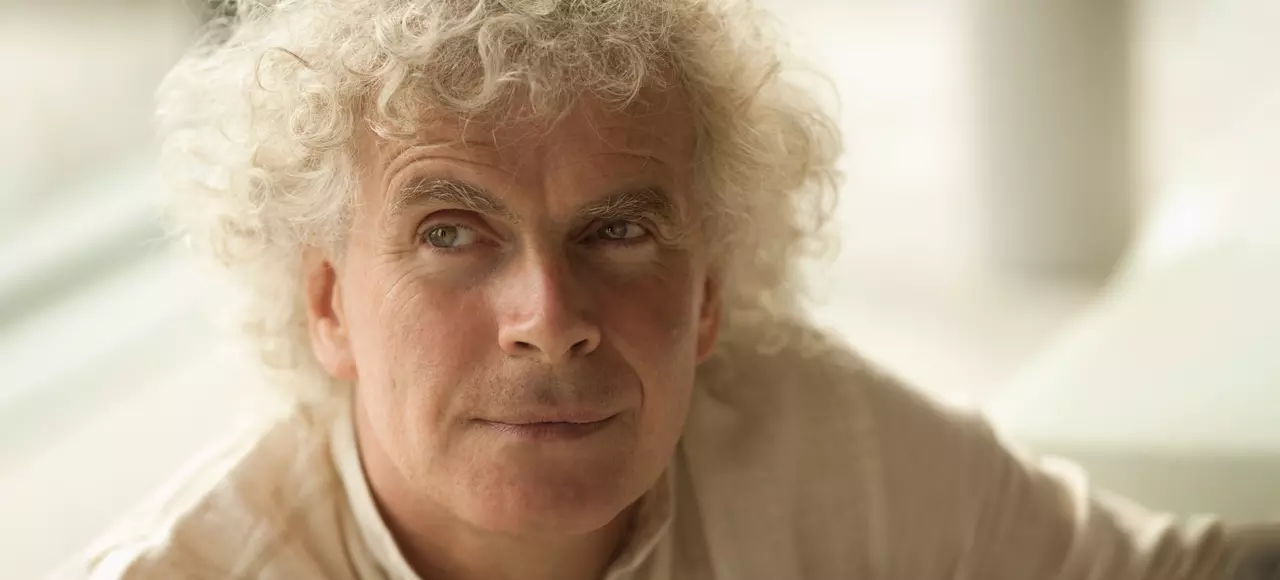

Sir Simon Rattle
News
Renaud Capuçon and Simon Rattle record Elgar's Violin Concerto
Elgar’s violin concerto – distinctively passionate and nostalgic – is one of the great late-Romantic concertos, but it is comparatively rarely played. As both Renaud Capuçon and Sir Simon Rattle point out, it is not a piece that has been favoured by French violinists. Perhaps, despite the worldwide currency of the composer’s cello concerto and Enigma Variations, this arises from some lingering perception of the composer’s music as exclusively and mysteriously ‘English’.
At the concerto’s premiere in 1910, the London Symphony Orchestra – which Rattle, as Music Director, conducts for this recording – was joined not by a British soloist, but by Fritz Kreisler, born in Vienna and one of the pre-eminent violinists of his day, indeed of the entire 20th century. He commissioned the work, being of the view that: “If you want to know whom I consider to be the greatest living composer, I say without hesitation Elgar … I place him on an equal footing with my idols, Beethoven and Brahms ... His invention, his orchestration, his harmony, his grandeur, it is wonderful. And it is all pure, unaffected music.”
In 2008, Kreisler was among the great violinists of the past whom Renaud Capuçon honoured with his album Capriccio. “The Elgar concerto is a huge piece,” he says, “both in terms of its length [some 50 minutes] and its romantic and noble nature.” Capuçon has known Sir Simon Rattle for some 20 years, but this is their first recording together. “He is a gentleman in music,” continues Capuçon, “he doesn’t put pressure on the soloist. I had the feeling I could surf on the LSO’s sound. Its players love the music and they are ‘there’ straight away … disciplined, but adapting around you as a soloist.”
Elgar, who was himself a violinist, had a close relationship with the London Symphony Orchestra. In 1905, when the LSO was just a year old, he conducted it on its first provincial tour and it gave the premiere of his Introduction and Allegro. In 1911 he became the orchestra’s Principal Conductor, going on to hold the post for two years. The LSO subsequently premiered his symphonic study Falstaff (1913) and his cello concerto (1919), and in 1932 Elgar conducted the LSO for the legendary Abbey Road recording of the violin concerto with Yehudi Menuhin as soloist.
Sir Simon Rattle chose music by Elgar, the Enigma Variations, for his inaugural concert as Music Director of the LSO in 2017. He describes the violin concerto as “a masterpiece and also a monster piece,” pointing out that it is probably the longest concerto written before the 1960s. “It is conceived on a broad canvas, but it is also very personal and intimate.”
The most celebrated passage of the concerto comes in the final movement with an extended and complex cadenza. Not only is such a cadenza more usually allocated to the first movement of a concerto, Elgar also chose to give it an accompaniment: a shimmering background of what he called ‘thrumming’ on the orchestral strings – a kind of ‘pizzicato tremolo’. Among the material explored in the cadenza is a phrase Elgar called the ‘Windflower’ theme in letters he wrote to a family friend, Alice Stuart-Wortley. Although he was happily married – his wife was also called Alice – he had an intense affection for Mrs Stuart-Wortley, whom he gave the sobriquet ‘Windflower’. It is also highly possible that he had her in mind with the enigmatic Spanish epigraph he placed on the score of the concerto.
Renaud Capuçon senses the idea of a secret love in the slow movement of Elgar’s Violin Sonata, first performed in 1919. Pairing it with the concerto on this album, he is joined by one of the leading British pianists of today, Stephen Hough; the duo first collaborated in early 2020 at London’s Wigmore Hall. “The sonata is a work of nobility and tenderness,” says Capuçon. “The long phrases in the slow movement make me think of someone who is in love, but afraid to say it.” Hough feels that this expressive landscape is “very English in its combination of reserve, frustration and passion. Elgar’s music is not obvious … it can go off in strange directions. Like the violin concerto, the sonata is dangerous music, in that it can get so close to sentimentality, but it never tips over the edge.”
Capuçon, Rattle and the LSO came together for this recording at LSO St Luke’s, a former church, designed in the 18th century by Nicholas Hawksmoor, architect of several famous churches in and around the City of London. St Luke’s, both a concert and recording venue, is near the LSO’s principal home, the Barbican Centre. For their recording of the violin sonata, Capuçon and Hough headed to north-west London and the church of St Jude-on-the-Hill in Hampstead Garden Suburb. Not only was the church designed by Elgar’s great contemporary Sir Edwin Lutyens – in some respects the composer’s architect analogue as a representative of his era – its consecration took place just a year after the premiere of the violin concerto. It also happens that, from 1911-1921, Elgar’s London home was in neighbouring Hampstead.
From Berlin to London: The Sound of Simon Rattle
On September 7, 2002, Sir Simon Rattle gave his debut as new Principal Conductor of the Berlin Philharmonic in the Philharmonie, the great concert hall of the German capital, heralding an era that was to prove highly memorable for the world of music.
From the word go, Rattle mesmerized his audiences with his electrifying verve and insatiable curiosity; this, combined with his enthusiasm for opening up new repertoire channels for the Philharmonic, placed him firmly on course to bestow a more youthful image on this most traditional of orchestras, transforming it with his inimitable “Rattle Sound”, some of the greatest moments of which are presented on this new three-album collection, The Sound of Simon Rattle.
What is really striking is Rattle’s fascination with works that marked the transition between the Romantic and Modern eras of music. His stupendous Mahler interpretations, for instance, have now acquired benchmark status. In the same vein, Rattle’s reading of Stravinsky’s The Rite of Spring, the work which caused such a scandal at its premiere, made this work accessible to and popular with young people previously uninterested in classical music.
Holst, Ravel, Mussorgsky, Tchaikovsky, Debussy, Borodin, Orff and Elgar have all helped in revealing Rattle’s skills as a sound magician who is equally able to open up new perspectives on the traditional repertoire ranging from Haydn through Beethoven and Schubert to Brahms – thereby leading the Berlin orchestra with its legacy of Furtwängler, Karajan and Abbado into the new millennium.
The recording of the soundtrack to Tom Tykwer’s blockbuster film Perfume marked the first time ever that the Berlin Phil and its principal conductor have provided the orchestration to a movie. And Sir Simon is the first rapper to hold that post, as witnesses Sergio Cárdenas’ piece The Flower is a Key (A Rap for Mozart), featuring the 12 cellists of the Berlin Philharmonic.
Sir Simon Rattle will take up his new appointment with the London Symphony Orchestra in September 2017, fifteen years after he became Principal Conductor of the Berlin Philharmonic. The Sound of Simon Rattle is out 19 February, 2016.
Simon Rattle and the London Symphony's only recording to date finally reissued!
Just weeks after the hotly anticipated announcement of Sir Simon Rattle's next post as chief conductor of the London Symphony Orchestra, Warner Classics is proud to re-release the first recording they made in 1977; their only album together to date.
Rattle, who celebrated his 60th birthday last month, was just 22 when he recorded Ravel and Prokofiev piano concertos with the LSO and soloist Andrei Gavrilov at London's famed Abbey Road Studios; shortly afterwards he took up his post with the Birmingham Symphony Orchestra.
The album went on to win a Gramophone Award in 1979: "However high your expectations may be, I would be surprised to learn that they were disappointed ... This newcomer is second to none in both works...A conductor of keen responsiveness and sensitivity,” reads the Gramophone review.
As he prepares to relinquish his long-held post at the Berlin Philharmonic, Sir Simon will take the helm of the LSO in 2017, 40 years after his recording debut with the orchestra.
Prokofiev & Ravel Piano Concertos with Andrei Gavrilov and the LSO conducted by Simon Rattle is reissued today.
Joyce DiDonato to make Berlin Philharmonic debut with Simon Rattle at the podium
American mezzo-soprano Joyce DiDonato has given unforgettable performances all over the world, from her recent spell at the Metropolitan Opera in New York in Rossini's La Donna del Lago and her acclaimed Maria Stuarda at Covent Garden in 2014 to her Perspectives series of recitals at Carnegie Hall. And who could forget last year's soaring national anthem at the baseball World Series in support of her home team the Kansas City Royals, broadcast to more than 25 million viewers?
Now DiDonato at last makes her Berlin Philharmonic debut with Sir Simon Rattle in the tour-de-force role of Marguerite in Berlioz's La Damnation de Faust.
Among her castmates as Méphistophélès is the bass Ludovic Tézier, one of the opera world's most in-demand singers, who appears on Diana Damrau's new album Fiamma del Belcanto.
Performances of La Damnation de Faust will take place at the Baden-Baden Easter Festival on 5 April, followed by two concerts at the Berlin Philharmonie on 10-11 April. This final performance will be streamed live via the Berlin Philharmonic Digital Concert Hall, free with the 48-hour free access code BADENBADEN2015.
DiDonato described rehearsals this week with Rattle and the BPO as "beyond a dream come true. These 2 days of rehearsals have been some of the greatest music-making experiences I have ever had the pleasure of taking part in," she enthused.
Simon Rattle's first recording with the London Symphony Orchestra to be reissued
In March 2015, after months of lively speculation in the media, the London Symphony Orchestra formally announced that Sir Simon Rattle would become its Music Director in September 2017. This news made headlines in the UK, where Liverpool-born Rattle, despite his departure in 2002 to become Chief Conductor and Artistic Director of the Berliner Philharmoniker, remains a national cultural hero.
As Rattle told The Times: “I am leaving a world-class orchestra and coming to a very different sort of world-class orchestra.” In a video interview, he added: “The LSO and I share so many of the same ideals – it just made complete logical sense, and emotional sense as well ... This can be the greatest orchestra in the world. Everybody is pointing in the same direction.”
No appearance by Rattle and the LSO is ever likely to reach as many people as their performance at the opening ceremony of the London 2012 Olympic and Paralympic Games, watched by an estimated one billion people worldwide, but it was just the highest-profile date in a relationship that goes back to 1977. At that time, Rattle was only 22 years old and not yet Principal Conductor of the City of Birmingham Symphony Orchestra – he took up that role in 1980 and, as Music Director, left Birmingham 18 years later.
While his concert debut with the LSO took place in October 1977, he had in fact already made his first recording with its players. In July of that year, at London’s famous Abbey Road Studios, he conducted them and soloist Andrei Gavrilov – born, like Rattle, in 1955 – in a pairing of two compact, concentrated works: Prokofiev’s high-octane Piano Concerto No 1 and Ravel’s brave and intense Concerto for the Left Hand.
Gavrilov, who trained at the Moscow Conservatory, had achieved widespread recognition in 1974 when he won the International Tchaikovsky Competition and went on to make his international debut at the Salzburg Festival.
The album, which represented both the conductor’s and the pianist’s debuts on the HMV label, is the earliest Rattle recording in the Warner Classics catalogue. When it was originally released in 1978, Gramophone opined: “... However high your expectations may be, I would be surprised to learn that they were disappointed ... This newcomer is second to none in both works,” and praised the young Rattle as “a conductor of keen responsiveness and sensitivity.” The recording went on to win a Gramophone Award in 1979.
Prokofiev & Ravel: Piano Concertos is slated for reissue on 27 April, 2015.
Simon Rattle appointed Music Director of the London Symphony Orchestra
The London Symphony Orchestra confirmed this morning that Sir Simon Rattle has accepted the post of Music Director from 2017. The orchestra's previous principal conductors include André Previn, Michael Tilson Thomas, Sir Colin Davis and Valery Gergiev.
The Liverpool-born Rattle has been Chief Conductor and Artistic Director of the Berliner Philharmoniker since 2002, with whom he has recorded dozens of albums including an acclaimed Brahms German Requiem, Holst's The Planets, Bruckner symphonies. His first appearance with the London Symphony Orchestra was in October 1977, at the age of 22. He conducted the LSO at the opening ceremony of London 2012 Olympic and Paralympic Games, memorably performing Chariots of Fire with Rowan Atkinson.
It was with another English orchestra, the City of Birmingham SO, that Simon Rattle first came to prominence; his Sibelius cylce with that orchestra was reissued this year.
“During my work with the LSO over the last years, I noticed that despite the Orchestra’s long and illustrious history, they almost never refer to it. Instead, refreshingly, they talk about the future, what can they make anew, what can they improve, how can they reach further into the community," said Rattle in a statement today. "In terms of musical excellence, it is clear that the sky's the limit, but equally important, in terms of philosophy, they constantly strive to be a twenty-first century orchestra. We share a dream in which performing, teaching and learning are indivisible, with wider dissemination of our art at its centre. I cannot imagine a better or more inspiring way to spend my next years, and feel immensely fortunate to have the LSO as my musical family and co-conspirators.”
Simon Rattle's 60th birthday celebrated in a month of BBC events and programmes
BBC Two, BBC Four and BBC Radio 3 mark the 60th birthday of Sir Simon Rattle, one of Britain’s best-loved and greatest living conductors, with a month of special programming across January and February 2015.
A major new BBC Two documentary Simon Rattle: The Making of a Maestro (Saturday 14 February), the first television biography of the British conductor for 15 years, charts Rattle’s formidable career spanning four decades through new and archive footage and an in-depth interview with the maestro himself. The documentary follows the Chief Conductor and Artistic Director of the Berliner Philharmoniker for a year, gaining unrivalled insights and access into the life of a world-beating conductor. Simon Rattle: The Making of a Maestro follows a remarkable journey. It shows Rattle talking candidly about his life and beliefs with contributions from artists and friends who have worked closely with him including violinist Anne-Sophie Mutter, composer Thomas Adès, singers Roderick Williams, Mark Padmore, director Peter Sellars and Managing Director of the Barbican, Sir Nicholas Kenyon.
BBC Arts Online (bbc.co.uk/arts) will also feature an extended interview with Rattle drawn from the documentary, and a film archive collection which charts Rattle’s career as documented by the BBC and his significant creative commitment to television as a medium for drawing a new audience to classical music.
BBC Radio 3 and BBC Four broadcast Rattle’s upcoming major London Residency with the Berliner Philharmoniker at the Barbican and Southbank Centre in February 2015. BBC Radio 3’s Live in Concert broadcasts Rattle conducting the complete Sibelius symphony cycle in the 150th anniversary year of the composer’s birth (Tuesday 10, Wednesday 11 & Thursday 12 February – Barbican), Mahler’s Symphony No. 2 ‘Resurrection’ and Helmut Lachenmann’s Tableau (Saturday 14 February – Southbank Centre). As part of the BBC Arts initiative to bring significant cultural events from the greatest cultural venues to audiences, presenter Kirsty Wark hosts a BBC Four broadcast of Rattle conducting Sibelius’ Symphonies 5, 6 & 7 (recorded at the Barbican on 12 February) on Sunday 15 February, and Sibelius’s Symphonies 1, 2, 3 & 4 (recorded at the Barbican on 10 & 11 February) will be available on BBC iPlayer.
Previously unheard archive recordings of Rattle conducting the City of Birmingham Symphony Orchestra twenty years ago are broadcast for the first time on BBC Radio 3 across Rattle’s birthday week (Monday 19 – Friday 23 January). Listeners will be the first to hear the recordings when they are broadcast on BBC Radio 3’s In Concert, presented by Tom Service. Recorded over five days at the Alte Oper Frankfurt in the autumn of 1995, listeners have the opportunity to hear Rattle conducting his first ever Beethoven symphony cycle with the orchestra he led for eighteen years. A unique record of one of the great partnerships between conductor and orchestra in British music, the recordings also include Beethoven’s Overture to Fidelio, his Leonore Overtures Nos 1 & 2 and the Funeral March for Leonore Prohaska.
Other highlights include BBC Radio 3’s Essential Classics featuring Rattle as its Artist of the Week (Monday 19 – Friday 23 January) and BBC Radio 3’s Through the Night offers the chance to listen again to Rattle and the Berliner Philharmoniker presenting Peter Sellars’ staging of Bach’s St Matthew Passion for the first time in the UK at the BBC Proms 2014 (Sunday 18 January).
Sir Nicholas Kenyon, Managing Director, Barbican Centre, says: “Sir Simon Rattle has been one of our most inspirational musicians for so long that it is a shock to realise he is reaching sixty! His energy and his musical leadership are stronger than ever, and we are delighted to be welcoming him back to the Barbican with both the LSO and the Berliner Philharmoniker. It is great that the BBC, with its renewed commitment to the arts, is marking the occasion so fully across its networks and relaying the concerts from the Barbican Centre during The London Residency 2015.”
Happy birthday Sir Simon Rattle! The Berlin Philharmonic maestro turns 60 today
Today marks the 60th birthday of one of the greatest conductors of our time, Sir Simon Rattle. Born in Liverpool in 1955, he studied at the Royal Academy of Music in London, rising to the posts of chief conductor of the Berliner Philharmoniker and artistic director of the Berliner Philharmonie in September 2002.
Warner Classics is celebrating this milestone with a monthlong focus on Rattle's rich and varied catalogue of Warner Classics albums with his beloved Berlin Philharmonic: from rousing Beethoven, Brahms and Bruckner to his award-winning Mahler cycle, to new directions in Messiaen. Discover 29 essential recordings on the iTunes Berlin Philharmonic page, all specially mastered in high-quality sound for iTunes.
We start with Mahler's Resurrection Symphony No.2, which Sir Simon describes as "the piece that made [him] take up conducting in the first place."
BBC Proms: William Christie, John Wilson Orchestra and Simon Rattle announced
The 250th anniversary of Jean-Philippe Rameau this year brings a touch of French chic to the BBC Proms, according to the mammoth festival program announced this week.
And who better to celebrate with than William Christie, the harpsichordist and conductor who has been at the forefront of the French Baroque movement for the past 30 years, and whose Rameau recordings with Les Arts Florissants for Erato remain unparalleled in their vibrant energy, elegance and historical authority?
First, Les Arts Florissants open the Proms Chamber Music series with the charming Pièces de clavecin en concerts. Christie then directs the full ensemble and a cast of France’s finest Baroque singers, transporting listeners from the vast Royal Albert Hall to the glittering, marbled splendour of Versailles in a concert of Rameau’s motets — a classic recording on Erato. (In keeping with the French theme, Alexandre Tharaud makes his Proms concerto debut with Ravel's tour-de-force Piano Concerto for the Left Hand.)
From Baroque to Broadway: another major act in this years Proms is returning favourite the John Wilson Orchestra, with a production of Kiss Me Kate in its original 1948 arrangements.
On the orchestral and opera front, Simon Rattle leads his Berlin forces in a blazing Russian program of Rachmaninov’s Symphonic Dances and Stravinsky’s Firebird (both available on Warner Classics, the former released last year); Roxanna Panufnik's Three Paths to Peace receives its premiere from the Orchestra for World Peace, and Vasily Petrenko and the Royal Liverpool Philharmonic Orchestra take on Strauss and Elgar. Emmanuel Pahud gives the world premiere of Simon Holt's flute concerto Morpheus Wakes. Soprano Kate Royal makes for a very regal Marschallin in Glyndebourne's Der Rosenkavalier, while Britain's raining trumpet queen, Alison Balsom, premieres a new concerto by Shanghai composer Qigang Chen.
The 2014 BBC Proms runs from 18 July to 13 September and will be streamed live. Full program now online.
Watch the video of last year’s highlights featuring Alison Balsom:
100th anniversary of the premiere of Stravinsky’s The Rite of Spring
A dress rehearsal, attended by musicians, balletomanes, artists and literati, had not caused offense but the evening premiere descended into anarchy as members of the audience voiced their outrage. A year later, in April 1914, when Monteux conducted two concert performances of Le Sacre du printemps in the Paris Casino, Stravinsky was mobbed by delirious admirers.
EMI Classics released several recordings of Le Sacre du printemps, the most recent one by Sir Simon Rattle and the Berliner Philharmoniker.
Click here to find out more about the album.
Celebrate the 100th anniversary of the premiere with a selection of our recordings on Spotify - to get to the playlist, click here.
Related releases
![The Berlin Years [Complete Warner].jpg](/sites/default/files/styles/search_result_260_x_260_2x_webp/public/2024-02/5054197685897%20Simon%20Rattle%20-%20The%20Berlin%20Years%2045CD%20%283D%29.jpg.webp?itok=wnIdA9M4)







